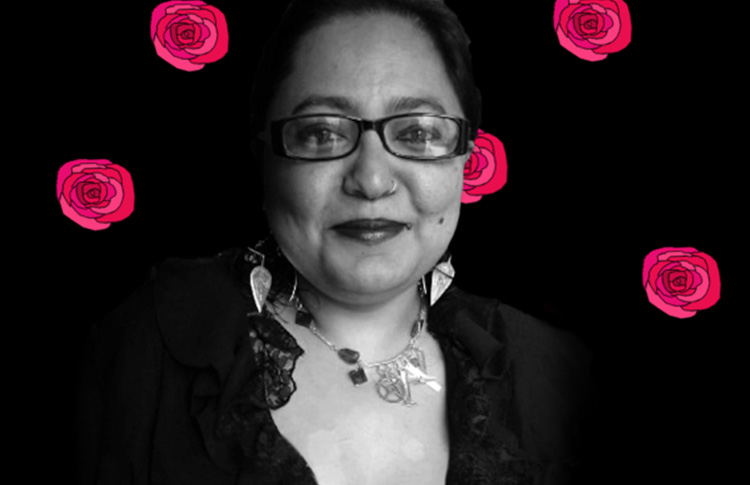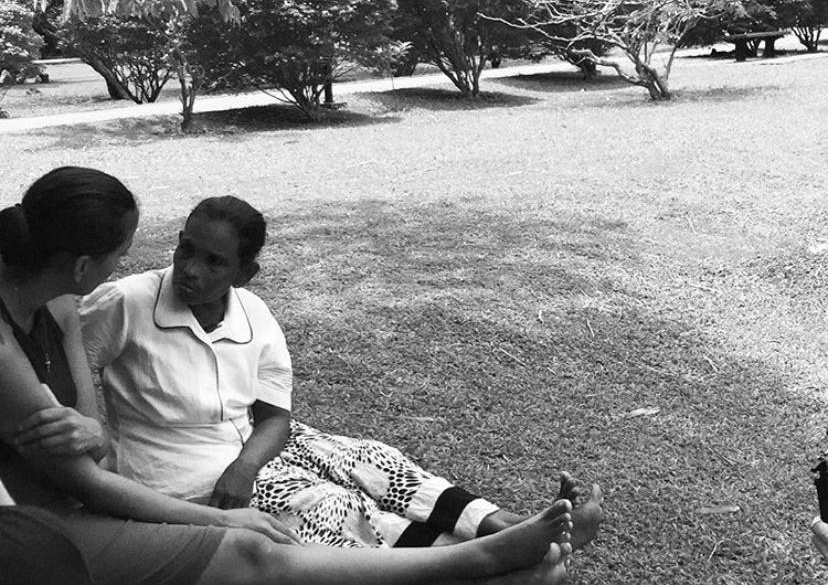Agents Of Ishq’s Paromita On Why Talking About Sex Should Be Like Talking About Food
- IWB Post
- November 28, 2017

I have never received any formal sex education. The closest I ever got to it was a Biology lecture in Grade 7 where, in just one lecture, our teacher completed an entire chapter. Unfortunately for me and fortunately for the gatekeepers of society, I was absent on that particular day. So, most of what I learned was off the internet. By asking questions like, “Is this normal? Does this happen to all teenage boys?”
It was a strange time really. I knew I couldn’t ask my parents. Not because they had asked me not to, but because there was an unspoken rule in Indian families that dissuaded me. It is the same rule that makes you jump up and change the channel whenever an actor and actress (mildly) kiss on screen. The rule that made you uncomfortable during the Public Service Announcement on the benefits of a condom. It’s implied, only ever explicitly stated when you dare to speak about sex or your body in public.
I recall when I went to watch the Hindi movie, “Agneepath” on the silver screen with my parents. And as soon as a particular item song blasted, I froze. My parents were sitting right next to me! (Come on Censor Board! Isn’t that the one thing you’re infamously known for?) I cannot tell you how long and uncomfortable those 5 minutes were. I breathed a sigh of relief when the movie went back to shooting people in cold-blood. Much more family friendly.
Like me, many young Indians go through a phase when their bodies change. The hormones began to kick in, and you start feeling weird things. Like the icky person from the opposite gender suddenly become more palatable. You start to have a million questions. But no one to ask to, no one to talk to. Your classmates only know as much as you do. You are all in the same boat.
Which is strange considering the sheer amounts of Indians in the world. Indians are having sex, we’re just not talking about it. We read about all the sex-related crimes happening around us, and we go further into our shells.
But there’s one organization which is attempting to change this. They call themselves the Agents of Ishq, and they have one mission. To normalize the conversation about Sex, Love, and Desire. I had the opportunity to talk to Paromita Vohra, the Creative Director of Agents of Ishq, about how talking about sex should be like talking about food.
How did you get the idea of starting Agents of Ishq?
Paromita: I always felt that in our country, there’s a lot being said about sex publically. But it primarily revolves around violence, disease or pornography. There’s no real conversation about sex in terms of understanding your body or safe sex. There is this whole emotional side to sex, which is never discussed in contemporary society.
There’s no sharing of experiences in a safe way. You might say that it is changing thanks to the internet, but that isn’t an Indian stuff. It is American content repurposed for Indians. Which is not the same thing. So, we wanted to create a safe space for anyone to enter. Because everyone’s experience is different. No matter what sexuality or where they come from, we can all learn from other people’s experiences. That is the beauty of Agents of Ishq.
Have you ever been personally told not to talk or ask questions about sex, perhaps as a kid?
Paromita: I made this movie called “Unlimited Girls” that has a dialogue, where the girl says, “I never knew Indian’s kissed. I thought kissing is only something White people did.” (laughs) See sex is just not a part of the conversation. You’re rarely directly told, it’s implicit. Of course, you’d be given a stern talking to or like a scary glance if you talk about sex. (laughs)
I never got any sex-ed. But I came from a progressive family. So, I had the ability to question things without a lot of pushback. But other people are certainly told there are certain things they can’t talk about. And we want to talk about everything.
How important is the need to normalize conversations about sex, love, and desire?
Paromita: Extremely important. Because the fact of the matter is we cannot diversify into sexuality until we normalize the conversation surrounding it. Think about sex as food. To have a good meal, you need to know what food is. Similarly, to have satisfying relationships and sex life, you need to know what sex is. Sex is about pleasure but also about survival. It is about interacting with another human being, making an intimate connection.
If we don’t do that, if we continue to associate sex with shame, we start hating ourselves. We get violent. I mean think about it. What is the point of teaching consent without normalization? If a girl doesn’t have the option to say “Yes” because she feels society might judge her, then how do we make the “No” carry weight?
We’re trying to see love and sex with the same perspective.
But aren’t love and sex inherently different. You can love someone without being sexually involved with them.
Paromita: That is certainly true. But we’re trying to end the hierarchy of love and sex. We should treat all people with love and kindness, irrespective of our sexual involvement with them. However, there is a need to see sex separately from marriage or dating.
Why do you think India is such a sexually repressed society when we have such a vivacious sexual past? Does it have something to do with Victorian Ideas of morality?
Paromita: First of all, I want to say that India is a very complex country. I’ve traveled across India and visited many small towns. And I want to tell you that not everybody is sexually repressed. The media has the tendency to paint the whole country with one paintbrush, but that is not the case. And yes, we definitely owe much of our repression to our colonial history. But also to the guardians of contemporary Indian culture.
See, we cannot selectively pick and choose what comprises of Indian-ness. If we’re speaking of the great Indian past, then sexuality is also a part of it. The idea that a true Indian is monogamous and repressed is simply not true because we come in all shapes and sizes. Would you call Sambhar more Indian than Dal Makhani?
The idea of sex in India is different and varied from what the gatekeepers of contemporary Indian culture and the media would have you believe.
Do you feel that the young generation is more comfortable when it comes to talking about sex? And does that reassure you about the future?
Paromita: I don’t think that the young generation is particularly comfortable with it. I feel they are exceptionally good at looking comfortable with it. (laughs) Because inside everybody’s hearts there are 101 uncertainties. For instance, in today’s day and age, everyone wants to look like they are okay with casual sex. But in many cases, they are not. Because there is a difference between casual sex and being treated casually. Also 20 years ago if you asked someone if they had had sex, they’d most probably deny if they have. But today, even if they haven’t they’d say they have because it’s cool to say so.
But the good thing is our attitudes are shifting. We are moving towards de-linking marriage or dating and sex. You can see that people are having sex at a younger age now than they did before. Even though there is nobody to guide them! The sex toy industry is booming in India. There are so many dating apps nowadays. Things are changing.
When is the right time to teach a young boy what consent is and how important it is?
Paromita: I get asked this question a lot. Many sex educators will tell you that you should start talking to children about their own bodies at an early age. Of course, you can use a more child-friendly terminology, but they should know about their bodies. But I also feel that girls are only told about their bodies and boys about theirs. Which should also change. Men and Women don’t learn about their digestive systems differently, why should they learn about reproductive systems differently?
And sex education is an absolute necessity and a very pressing issue. Research has shown that in Scandinavian (Denmark, Norway, and Sweden) countries, where they have good sex-ed, the age when people start having sex has gone up! Because young adults realize that along with being physically ready they also need to be emotionally prepared.
Teenagers are particularly susceptible to misinformation about sex and love. How can Agents of Ishq help them? Do you provide them with the safety of anonymity?
Paromita: Agents of Ishq is particularly targeted towards young people. We have topical language and pop culture references. We talk to young people and try to understand their problems and issues. We have created this unique user based experience. Where we don’t tell them who they are supposed to be or who they should be. We provide them space so they can understand who they are. They can talk to other young people and understand each other’s experiences.
We are also beginning to have Monthly events and workshops where we discuss some of the major issues of young people. The most common themes we have seen are How to deal with heartbreak and rejection.
We work our hardest to ensure secrecy and anonymity on Agents of Ishq. You can post anonymously and often we insist that you do. We had one young man tell us that he’d like to use his real name but we told him not to. Because maybe his parents don’t read his post but some cousin might. In fact, we created a Podcast service specifically to conceal the identity of our members.
What is your opinion on the legalization of prostitution?
Paromita: I feel sex work is just like anything else, it’s just work. Sex workers should have the same rights as anyone else. Legalization should only be done to the benefit of sex workers. They should have recourse and freedoms. Sex should be treated as anything else. Sex work and workers shouldn’t be treated as another category.
In a patriarchal society, not talking about a woman’s sexuality is a way of controlling her. This has to be done away with. And that’s one of our aims.
There are millions of young Indians who are stepping into the world with very little knowledge about sex, love, and desire. What is normal and what isn’t is being decided by internet videos and click-bait sites. They need someone to talk to about all the changes their minds and bodies are going through. They need clarity. An open conversation surrounding sex can make a lot of difference as they become teenagers.
From the sculptures of the Khajuraho Temple to the Kamasutra, we’ve never been particularly conservative or ashamed of talking about sex. Our art and culture have always portrayed Indians as a society comfortable with its sexuality. There is an urgent need to reclaim that.
You can read articles written by Paromita Vohra for Agents of Ishq, here.
Paromita Vohra is coming to Jaipur as one of the guest speakers at the Woman Up! Summit organized by Siyahi from December 1-3, 2017. She, along with many other self-driven women professionals, will speak on why we need more females at workplaces and discuss various ways in which we can create more employment for them. You can join the event here. Keep an eye on this space for the details.
- 0
- 0













